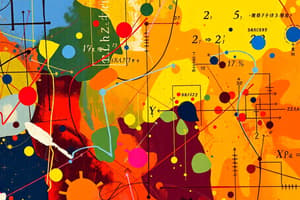Podcast
Questions and Answers
What is the range of values for expressing probability?
What is the range of values for expressing probability?
- 0 to 10
- 0 to 1 (correct)
- -1 to 1
- 1 to 100
Which type of probability is based on personal beliefs or opinions about an event?
Which type of probability is based on personal beliefs or opinions about an event?
- Empirical Probability
- Objective Probability
- Classical Probability
- Subjective Probability (correct)
In what type of probability are all outcomes of a random event assumed to be equally likely?
In what type of probability are all outcomes of a random event assumed to be equally likely?
- Objective Probability
- Classical Probability (correct)
- Subjective Probability
- Statistical Probability
What is the basis for Statistical Probability?
What is the basis for Statistical Probability?
How is the probability of an event calculated?
How is the probability of an event calculated?
Which type of probability is used in decision-making under uncertainty?
Which type of probability is used in decision-making under uncertainty?
What is the probability of drawing a spade from a deck of 52 cards?
What is the probability of drawing a spade from a deck of 52 cards?
Which rule states that the probability of an event not occurring is the complement of the probability of the event occurring?
Which rule states that the probability of an event not occurring is the complement of the probability of the event occurring?
In the tossing of a fair coin, what is the probability of getting tails?
In the tossing of a fair coin, what is the probability of getting tails?
Where is probability commonly used to calculate premiums and assess risk?
Where is probability commonly used to calculate premiums and assess risk?
What is the probability of drawing a face card from a deck of 52 cards?
What is the probability of drawing a face card from a deck of 52 cards?
Which field uses probability to model financial markets and calculate default probabilities?
Which field uses probability to model financial markets and calculate default probabilities?
Flashcards are hidden until you start studying
Study Notes
Probability
Probability is a branch of mathematics that deals with the likelihood of events occurring. It is a measure of the uncertainty or randomness associated with an event. Probability is expressed as a number between 0 and 1, with 0 indicating an impossible event and 1 indicating a certain event. The concept of probability is fundamental in various fields, including statistics, mathematics, science, and engineering.
Definition and Types of Probability
Probability is typically defined as the likelihood of an event occurring. It is expressed as a ratio of the number of favorable outcomes to the total number of possible outcomes.
-
Classical Probability: This type of probability is based on the assumption that all outcomes of a random event are equally likely. It is often used when the sample space is finite and all elements are equally probable.
-
Subjective Probability: This type of probability is based on personal beliefs or opinions about the likelihood of an event. It is often used in decision-making situations where there is uncertainty.
-
Statistical Probability: This type of probability is based on the frequency of events occurring in a large number of trials. It is often used in situations where the sample space is infinite or when the probabilities of the outcomes are not known.
Probability Calculation
The probability of an event is calculated by dividing the number of favorable outcomes by the total number of possible outcomes. For example, if there are 100 marbles, 50 of which are red and 50 are blue, the probability of drawing a red marble is:
P(Red) = Number of red marbles / Total number of marbles = 50 / 100 = 0.5
Probability Rules
There are several rules for calculating probabilities:
-
Addition Rule: The probability of an event or a combination of events is the sum of the probabilities of each individual event.
-
Subtraction Rule: The probability of an event not occurring is the complement of the probability of the event occurring.
-
Multiplication Rule: The probability of two or more independent events occurring is the product of the probabilities of each individual event.
Applications of Probability
Probability has numerous applications in various fields, including:
-
Statistics: Probability is a fundamental concept in statistics, which is the study of data and its analysis.
-
Insurance: Probability is used in insurance to calculate premiums and assess risk.
-
Finance: Probability is used in finance to calculate the probability of default, the probability of a stock increasing or decreasing, and to model financial markets.
-
Games of Chance: Probability is used in games of chance to calculate the probability of winning, the probability of getting a particular card, and to model the game itself.
-
Science: Probability is used in science to model the behavior of particles, to calculate the probability of a mutation occurring, and to assess the risk of an event.
Probability Examples
Probability is often illustrated through examples. One common example is drawing cards from a deck of 52 cards. The probability of drawing a spade is 1/4, while the probability of drawing a face card (Jack, Queen, King) is 1/13.
Another example is the tossing of coins. When tossing a fair coin, the probability of getting heads is 1/2 or 0.5, while the probability of getting tails is also 1/2 or 0.5.
Conclusion
Probability is a fundamental concept in mathematics and has numerous applications in various fields. It is a measure of the likelihood of events occurring and is expressed as a ratio of the number of favorable outcomes to the total number of possible outcomes. Probability is used to model the behavior of particles, to assess the risk of an event, and to calculate the probability of missing an event.
Studying That Suits You
Use AI to generate personalized quizzes and flashcards to suit your learning preferences.




